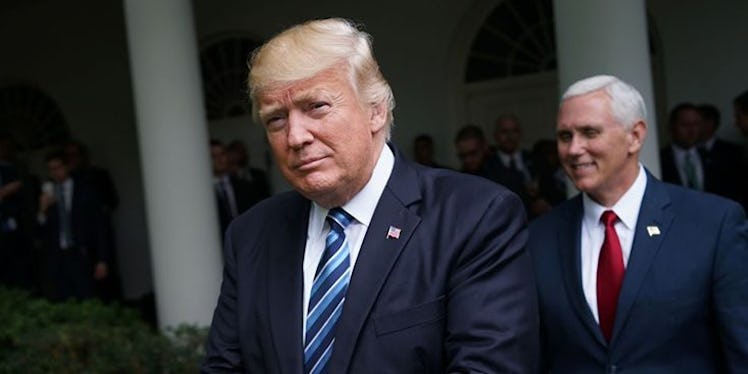
This Is What Happens If President Donald Trump Actually Gets Impeached
The prospect of President Donald Trump getting impeached is becoming more and more realistic.
This is largely because of three news stories that have broken in the past two weeks involving Trump and the FBI.
First came the news that Trump fired the former director of the FBI, James Comey. Then came the revelation, from Trump himself, that the FBI's investigation into possible ties between the Trump campaign and Russia was a factor considered before firing Comey.
Then, on Tuesday, the New York Times reported that, according to Comey, Trump asked him to end an investigation into the president's former National Security Advisor, Michael Flynn.
That combination of stories has raised concerns that President Trump may have committed obstruction of justice. For that exact reason, Rep. Al Green, a congressman and Democrat from Texas, called for Trump to be impeached on Wednesday morning.
Regardless of how successful Green is in rallying support for impeachment, his call does beg the question:
What would actually actually happen if Trump got impeached?
To answer this question, it's worth looking back to Green's own press release announcing his advocacy for impeachment.
In that release, Green said,
Impeachment, of the President, by the House of Representatives is not a finding of guilt. The House of Representatives cannot find the President guilty of anything. Only the US Senate can do this after a trial.
Green is right, of course. Impeachment does not remove a president from office, it only begins a process that may result in the president's removal.
Here's how it'd work if it happened to Donald Trump:
First, members in the House of Representatives would have to draft articles of impeachment, which essentially outline the charges being brought against the president.
According to the Constitution, presidents can be impeached for "treason, bribery, or other high crimes and misdemeanors," so the articles would have to describe which of Trump's actions fall under this broad description.
Then, the House votes.
To continue the process, the articles of impeachment would have to be brought to the House floor for a majority-rules vote.
In that case, there would have to be significant support for the idea of impeaching Trump among both Democrats and Republicans, since the GOP holds the majority in the House.
You could then expect hearings during which members of Congress who are for and against impeachment make their case.
Fun fact: Back in 1998, Bernie Sanders was one of the representatives arguing against impeaching Bill Clinton.
The president can be impeached for multiple charges at a time. Should 218 representatives vote "yay" on any individual charge, however, the process would then move to the US Senate.
Next, the Senate votes in a sort of trial.
At this point, the Senate would act as a courtroom of sorts.
Trump would have to select an attorney to defend him. Certain members of the House of Representatives would act as the prosecutors, and a Supreme Court justice would act as judge.
This process, complete with witnesses being called to the stand and cross-examinations, would likely take a number of months. Clinton's trial lasted a little over two months.
If Trump were to find himself under a similar position, the Senate would vote in private whether Trump is guilty or not. The vote would require two-thirds of senators to convict President Trump.
If that two-thirds margin is actually met, Trump would immediately be removed from office and would no longer be president. Otherwise, he'd still be Commander-in-Chief.
Citations: What would happen if Donald Trump were impeached? (The Guardian), This is how impeachment works — and what a president would have to do to be impeached (Business Insider), How Does the Impeachment Process Work? (Legal Zoom)